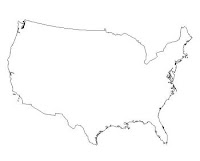 Several recent studies have confirmed that around one quarter of adult Americans do not bother to recycle.
Several recent studies have confirmed that around one quarter of adult Americans do not bother to recycle.The worst condition looks to be in South and Midwest where more than two thirds of people don't bother to recycle. Completely opposite are areas of East and West coast where close to 90% people recycle on daily basis.
RecycleBank program pays people with coupons to recycle in Arizona, California, Colorado, Connecticut, Delaware, Florida, Georgia, Illinois, Kentucky, Massachusetts, Michigan, Minnesota, Nebraska, New Jersey, New Mexico, Ohio, Pennsylvania, Texas and Virginia.
The most recycled items in America are metal cans and aluminium, followed by plastic, paper, and glass.
Americans could recycle much more than they are doing today. The most common excuses for not recycling are that recycling is not available in their area, and that recycling would take too much of their effort, and some even say that recycling is connected with relatively high and unnecessary costs. More than 10% percent of Americans believe that recycling has no purpose because it will make no difference on global level.
Overall situation with recycling in US could definitely improve, but at least there is an ongoing positive trend which shows that more and more Americans are helping our environment with recycling.
Federal government, as well as state and local governments need to continue building ecological conscience of American society so people would care much more for our environment than they are doing today.
Recycling is something each and every one of us could do for our environment, an easy proof to Mother Nature that we still care.




